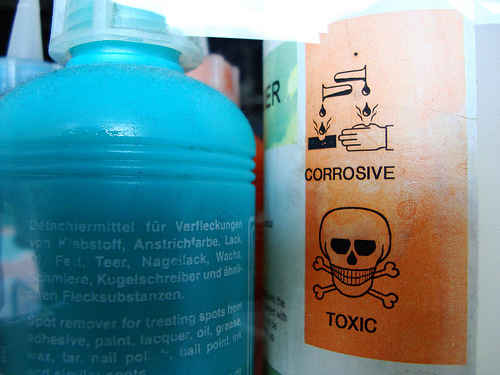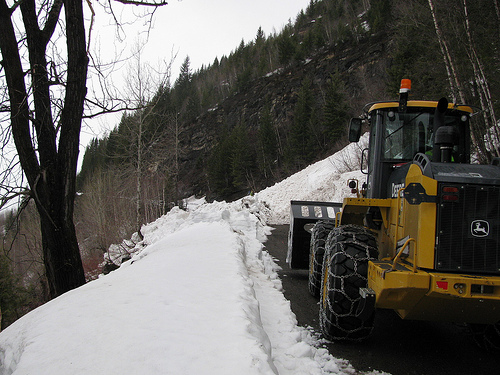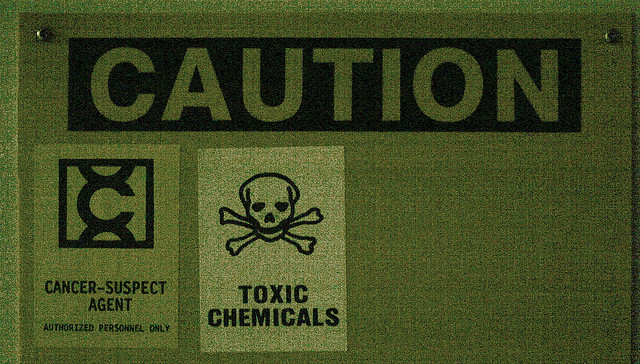Ever felt guilty about how you can’t recycle the plastic of a toothpaste tube and then considered how everyone you know uses them and throws them away? Ladies, have you ever thought about how many years your lip balm or lipstick container will remain on the earth after you are done with it? Environmental packaging options for these items has been stagnant (or non-existent, in fact) for quite some time, but I am happy to say that there are options out there and you just have to know where to look.
Audit, Compliance and Risk Blog
Tags: Business & Legal, Environmental risks, Environmental, EHS, Canadian
Hazardous Chemicals: Toxic Substances Control Act (TSCA) Approaches 40, Part 2
Posted by Jon Elliott on Wed, Mar 25, 2015
My most recent blog provided a short summary of chemical evaluation and reporting requirements under the Toxic Substances Control Act (TSCA) of 1976. These requirements apply when a manufacturer or importer is preparing to introduce a “new chemical substance” into commerce in the U.S., to provide the Environmental Protection Agency (EPA) with information to evaluate whether chemical hazards require regulatory restrictions (up to and including outright bans) to provide adequate protections to human health and the environment. TSCA does not include any blanket requirement for ongoing studies or updated evaluations of an “existing chemical substance” after it has entered commerce—including those already in commerce when TSCA took effect, so some chemicals have never undergone a regulatory review of their hazards.
Tags: Corporate Governance, Business & Legal, Health & Safety, Environmental risks, Environmental, EHS, EPA, Hazcom
OSHA: Winter’s Not Over Yet—Work Safe in Cold Weather
Posted by STP Editorial Team on Mon, Mar 16, 2015
Spring may be just around the corner, but winter isn’t over yet. Those of us who work in comfortable indoor spaces are fortunate that we only experience the cold weather on our way to and from work. However, for the many who work outdoors, the weather presents a daily challenge, especially during winter.
Tags: Corporate Governance, Employer Best Practices, Health & Safety, OSHA, Employee Rights, EHS
Environmental Compliance: Are You Using Water Efficiently?
Posted by Jon Elliott on Wed, Mar 11, 2015
Although day-to-day environmental regulations tend to focus on water quality, water quantity is also an issue … and can be a critical one. Here in California, we’re experiencing the third year of a drought of historic proportions; our Sierra Nevada snowpack is at 18% of average as winter ends. As the drought continues, state and local agencies are taking stronger and stronger measures to limit water use. The State Water Resources Control Board SWRCB) has just proposed to expand emergency regulations adopted in July 2014.
Tags: Corporate Governance, California Legislation, Environmental risks, Environmental, EHS, EPA
Although it’s been in the 70’s here in California, employers in most parts of the continent should be worrying about protecting workers against the extremely cold weather. Occupational safety and health regulators include “environmental” hazards as those that may require employers to provide their employees with personal protective equipment (PPE), and employers also bear a “general duty” to protect workers against recognized hazards. These requirements cover potential harm from extreme temperatures including cold. The U.S. Occupational Safety and Health Administration’s (OSHA) PPE standards address cold, and U.S. and Canadian guidelines apply general worker protection principles to "cold stress" hazards.
Tags: Corporate Governance, Business & Legal, Employer Best Practices, Employee Rights, EHS
Being a good citizen and composting food scraps really isn’t that hard if you live in a house. But what if you live in a condo? You might think it isn’t possible (or maybe you even think it isn’t worth it) to do your part and compost your organic wastes. Let me show you how to do it and why it’s worth it.
Tags: Health & Safety, Environmental risks, Environmental, EHS, Greenhouse Gas, ghg
After a facility determines it has generated hazardous waste, it must determine how to manage that waste in compliance with the federal Resource Conservation and Recovery Act of 1976 (RCRA), regulations issued by the US Environmental Protection Agency (EPA), and their state equivalents. (I recently wrote about hazardous waste determination, here and here).
Tags: Corporate Governance, Health & Safety, Environmental, EHS, EPA, Hazcom, RCRA
EPCRA Tier II: Key State Differences for Chemical Inventory Reporting
Posted by Melanie Powers on Wed, Jan 21, 2015
Tags: Corporate Governance, Business & Legal, Health & Safety, EHS, Hazcom, STC, Webinar
Hazardous Chemicals: Our Communities Have the Right to Know
Posted by STP Editorial Team on Wed, Jan 14, 2015
Our communities have the right to know when they are at risk of exposure to dangerous substances from accidental releases such as, but not limited to, chlorine, ammonia, hydrochloric acid, and sulfur dioxide. The US Environmental Protection Agency (EPA) agrees. In 1986 EPA created the Emergency Planning and Community Right-to-Know Act (EPCRA) to help communities plan for just such emergencies. EPCRA requires that federal, state, and local governments, Indian tribes, and industries be prepared for hazardous chemical emergencies. It also requires facilities to follow all recordkeeping requirements and report the storage, use, and release of hazardous chemicals to federal, state, and local governments.
Tags: Corporate Governance, Business & Legal, Employer Best Practices, Health & Safety, Employee Rights, Environmental risks, Environmental, EHS, EPA, Hazcom
Waste Identification Part II: Is My “Solid” “Waste” A “Hazardous Waste”?
Posted by Jon Elliott on Mon, Dec 08, 2014
Federal and state laws govern “hazardous wastes”—the federal law is commonly called RCRA, after the Resource Conservation and Recovery Act of 1976. However, RCRA itself was enacted as an expansion of the prior Solid Waste Disposal Act of 1965, and requirements for both solid and hazardous wastes have been revised many times in recent decades. The US Environmental Protection Agency (EPA) administers these requirements nationally, delegating many provisions to individual states that qualify for authorization to assume regulatory roles.
Tags: Business & Legal, Health & Safety, Environmental risks, Environmental, EHS, Hazcom










